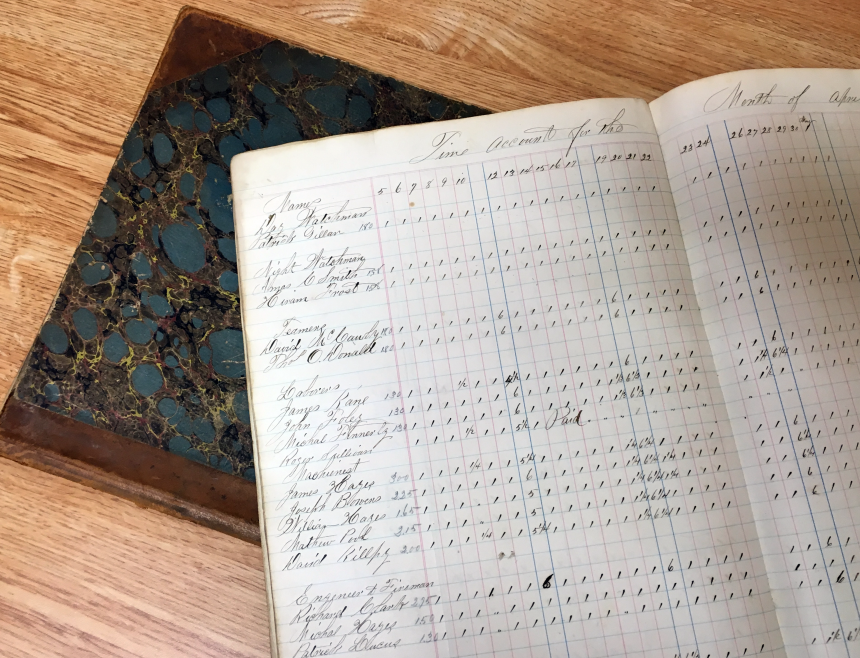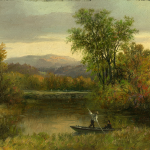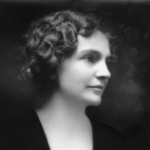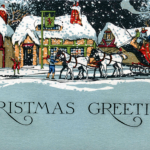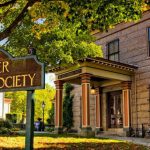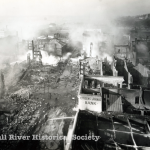Hard to believe that it is already March and that yours truly has not posted since December … time does fly, as they say.
But there is reason for my seeming negligence.
The FRHS is currently closed for the season – a much-welcomed respite following the busy holiday season. The decorations, by the way, took seven weeks to install but were dismantled, packed, and stored away in only two days. Other than a few faceted grains of glitter imbedded in the carpet pile that remain despite vigorous vacuuming and occasionally glisten in the light – to taunt me, I believe – not a trace of the “festivities” was to be seen by the 4th of January. I was delighted to be rid of them.
But do not think for a moment that we have been idle. Far from it, actually. The office has remained open – sans a bit of personal time off – and much has been going on behind the scenes.
We try to maximize the time afforded by our hiatus from visitors to indulge in relatively undisturbed worktime – impossible when the museum is open – and this winter, in addition to the customary day-to-day business, have been undertaking several projects, making considerable headway.
What, you might ask?
- Preparing archival collections for cataloguing – specifically 18th to early 20th century Fall River business, church, and club records; hundreds of volumes to process.
- Researching provenance on a few recent acquisitions – the thrill of the hunt, really. Amazing, what one can uncover.
- Converting the old accession numbers used by the FRHS for decades to a modern, standardized system – VERY involved, perhaps best described as persnickety and somewhat daunting.
- Completing the final edits on the next edition in the Discourses on History Series to be released by the Fall River Historical Society Press in the spring – two papers written by Thomas Richmond Burrell (1861-1953) detailing his reminiscences of Fall River’s Main Street in the 1870s and 1880s. Fascinating material.
In addition:
There have been some very fine donations of ephemera and artwork to the museum collections; there is an important book on Fall River textile history soon to be published by the FRHS Press – a stellar work, that; and we are planning a major reinterpretation of one of the FRHS collections. Further details will be discussed in these pages, so stay tuned.
Oh yes … we are working with the BBC, specifically, on an upcoming episode of the acclaimed British television series Who Do You Think You Are?
Thanks to the important archival collections maintained by the FRHS, and the superior sleuthing skills of a local independent researcher, a British production company tasked with producing a particular episode of Who Do You Think You Are? has reason to visit the United States.
Specifically, to visit Fall River.
In a posting on October 16, 2018, I discussed the extensive assortment of Troy Mills records housed in the FRHS archive – the museum maintains the largest and most important collection of Fall River textile records extant, and is the principal repository for such material – and presented a letter received from an independent researcher who was undertaking a records search for the BBC.
You may recall that they were “overjoyed” with the findings.
How significant is the FRHS collection?
Here is an update, received just a few days ago:
March 6, 2019
Dear Michael Martins,
As a follow up to my last letter to you thanking the Fall River Historical Society for being the sole archive of so many of Fall River’s textile and mill records, I wanted to update you on my researching success.
I was hired as an independent researcher working on a project for the BBC for an upcoming episode of WHO DO YOU THINK YOU ARE? They never say who the star is that they are requesting historical information about, but they are serious about the information being primary source material: the actual records of the period.
Thank you for allowing me further access to the Troy Mill records, city directories, and city documents. I was able to locate even further details about this family and the BBC is again very happy with the results. The work records in the Troy Mill books painted a previously unknown narrative of this family’s struggles.
Fall River played an integral role in this family’s story, albeit a very sad one. The BBC plan to film in the city in the coming weeks. Without the Society’s records, this narrative could not be told. This invaluable collection will prove to be the only way anyone could gain insight into this family’s Fall River history.
Thank you!
So, there you have it.
In the words of the researcher: “The work records in the Troy Mill books painted a previously unknown narrative of this family’s struggles.”
Poignant stuff, that.
Following several discussions with the FRHS, representatives of the production company will be doing a recce visit to the museum next week in preparation for filming, likely to occur later next month.
Who Do You Think You Are? is a widely popular British genealogy-based documentary series that is watched by in excess of 6 million viewers; the episode with Fall River content will be aired as a segment of their sixteenth season.
The premise of the show: A British celebrity of some sort – customarily, their identity is not revealed until making his or her appearance – is introduced to their familial history and presented with evidence, whenever possible on site, of the lives of their ancestors – fascinating.
The American version of the television series, which many are likely more familiar with, has a slightly different format.
So, if not for the Troy Mills records housed at the FRHS, there would be virtually no tangible evidence of this particular family’s history in Fall River. More than sufficient reason, it appears, for the as-yet-unidentified-individual-of-note to make the trek to the former home of their ancestors – the once powerful Spindle City – to experience a tale of episodic struggle and abject poverty, with a few heart- wrenching twists along the way.
For them, the veil of time will be lifted, albeit briefly.
How significant is the FRHS collection?
Clearly, very significant.
In my estimation, this serves to reinforce exactly how important the work of the FRHS actually is.

